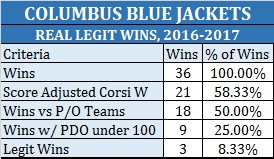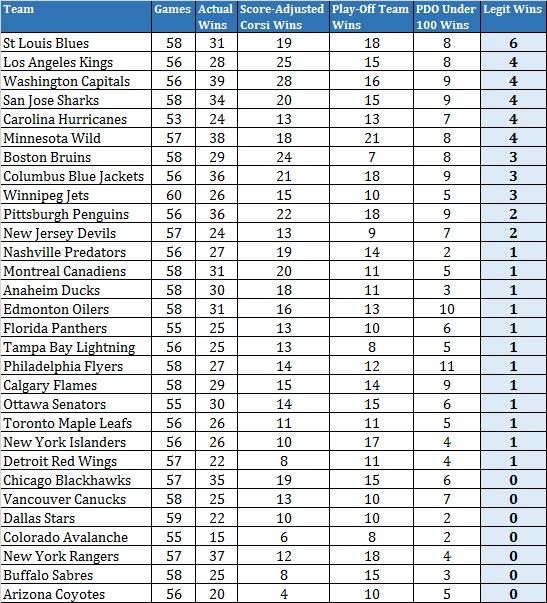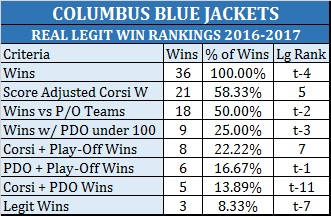There’s been a lot of talk this year about how “lucky” the Columbus Blue Jackets have been to get where they are in the standings, and how they’re not an “elite” team because of it. While I don’t agree with the idea on general principle, there is a bit of truth to it.
The team has played the majority of the season with a staggeringly high shooting percentage and save percentage – both of which sit well above league average, and well above typical norms for their players on individual levels. I also understand the questions surrounding the team’s ability to sustain their current points pace, which shouldn’t be a shock considering that they won 16 damn games in a row, an incredibly rare feat and one rife with “WELL ACTUALLY” possibilities. I personally do not believe that the team should be classified as “elite”, but more like “very good”. Therefore, I do understand the skepticism that many have about the team.
However, as I said, this is still a very good team, one which is a play-off-worthy squad regardless of any lucky breaks they’ve had this season. I will also mention that the concept of luck is another argument entirely, since every team in the league encounters good luck throughout a season, no matter if they’re elite or dog doo.
But some people don’t agree. They wonder how this Blue Jackets team isn’t as bad as they had predicted during the pre-season. They insist that there’s nothing real or dangerous about this team. They hate John Tortorella and cannot believe that a person could potentially change their ideas when surrounded with a new coaching staff and player base. They don’t like the fans, who are very aggressive, with a bit of a Napoleon Complex and “us against the world” mentality. They dislike Brandon Dubinsky because he does trashy things sometimes, or have it out for Nick Foligno because he had a real high shooting percentage two years ago and vindicated their concerns by not duplicating it last season, or Alex Wennberg because he gets a lot of secondary assists.
These folks have very specific ideas as to what qualifies as a REAL win in the NHL, or at least, what qualifies as a real win for the Columbus Blue Jackets.
REAL LEGIT WINS
To these people, a Columbus Blue Jackets win is only a “legitimate” victory if ALL of the following criteria are met:
- Columbus wins the game, which is about the only one of these qualifications that makes sense.
- Columbus has a higher score-adjusted Corsi than their opponent, because otherwise they got lucky.
- The opponent is a current play-off team as of today, regardless of where they were on the date of the game, because otherwise Columbus is just beating an also-ran.
- Columbus has a PDO of 100 or less, otherwise they got lucky.
If the team only meets part of the criteria – even the “winning the game” part – then it disqualifies them from a “legitimate” victory, and thus it will go into the record books as a “loss” everywhere but the standings.
Now that we have our qualifications set, let’s have a look through the Columbus Blue Jackets season to see just how legitimate they are.
Huh, only three legit wins out of 56 total games. That’s pretty pathetic, and would see the Blue Jackets sit 30th in the NHL standings with just six points, since, as far as I know, they’ve been the only team in the league who has had to pass this rigorous grading system to earn their victories. That’s unfortunate! Maybe the critics were right!
Note that the three Real Legit CBJ wins were against the Rangers, and twice against Edmonton, meaning both of those teams are also likely mirages, since they can’t even beat a team with three wins!
Which brings me to my next question: Just how many Real Legit Wins does every NHL team have this season?
Let’s find out!
CALCULATING REAL LEGIT WINS
We start out with 853 games as of February 16, 2017, which means 853 actual wins.
Next, we separate the three categories:
There are 461 wins where the winner has also won the score-adjusted Corsi battle.
There are 393 wins where the winner has defeated a play-off team.
There are 186 wins where the winner has won with a PDO under 100.
And now we line them all up.
RESULTS
The amount of NHL games this season, out of 845 games played, where the winning team has won the score-adjusted Corsi battle, defeated a play-off team, and done so with a PDO under 100 is:
FIFTY-ONE (51).
In the entire season.
Here’s what the standings would look like under this new system:
This would be a real boring league if you could only win a game “legitimately”.
CBJ’s three Real Legit wins don’t seem so horrible now, as that puts them squarely in seventh place in the NHL, in a tie with Boston, Winnipeg, and Pittsburgh. Still though, they’re well behind the Real Legit Wins champion St Louis Blues, who top out with a whopping SIX, and obviously should be the favourites to win the Stanley Cup.
The New York Rangers, one of the teams that suffered a Real Legit Loss to the Blue Jackets, do not have a single Real Legit Win this season. Wow, what a fluky bunch of flukes. I wonder why people aren’t running around writing articles about just how awful they are… and note the Washington Capitals, who have the same amount of PDO Under 100 wins as Columbus, and fewer wins against play-off teams. Oh, but wait, their sky-high PDO doesn’t work against them because they LOOK like a better team than Columbus, and thus don’t have to face the same scrutiny. My mistake!
Now that we’ve seen how mundane and boring a Real Legit Win NHL would be, scale back the insanity meter here, and start grading out the teams based on how many of their wins come from various degrees of the aforementioned criteria.
Hey, this doesn’t seem all that bad, and paints Columbus as a pretty solid top ten team in the entire league, even after factoring in things like (rabble rabble) PDO!
That seems to really fly in the face of the accepted opinion from some smarmy know-it-all douchebags around Hockey Twitter and the Hockey Blogosphere. Maybe their criticisms are more based around their penchant for trolling particularly defensive fanbases (which I will admit that I am falling for right now), or their inability to ever concede that they were wrong about something, or just because they’re pricks.
CONCLUSION
You’re really going to need to suspend your disbelief for this one, but perhaps holding teams to this foolish standard is a particularly stupid idea and shouldn’t be done, even if it’s to further an already flimsy, questionable narrative.
Perhaps, indeed.
– Jeremy
Follow me on twitter, @307x
Add The Sports Daily to your Google News Feed!



